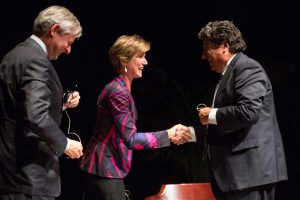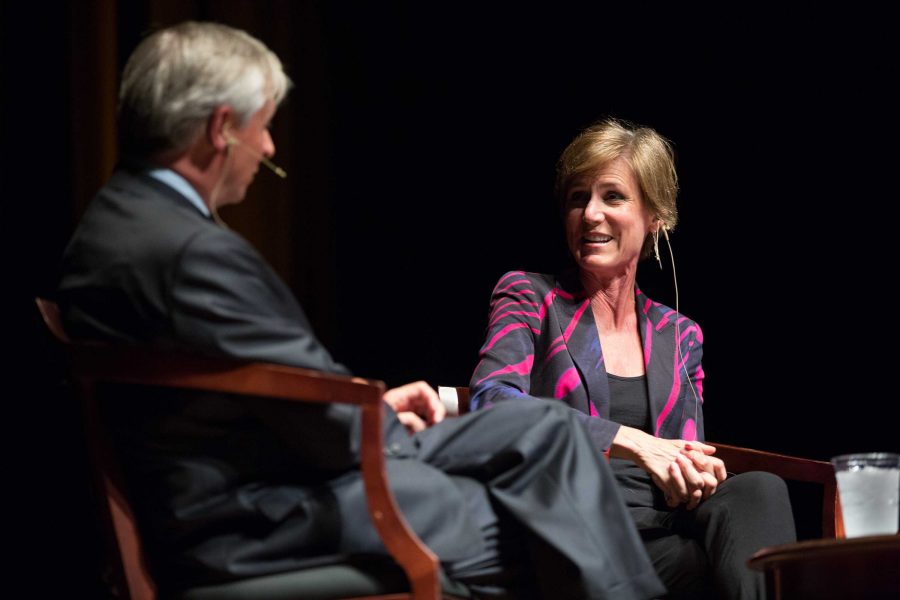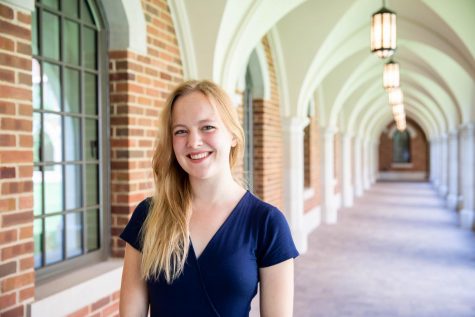Former acting Attorney General Sally Yates rose to prominence after her public firing just ten days into Trump’s term after she refused to defend the Jan. 27th travel ban. Prior to her role in the Trump administration, she spent 27 years with the Department of Justice and was the first female U.S. Attorney in the Northern District of Georgia. On Tuesday, she sat down with Chancellor Nicholas Zeppos and Vanderbilt Distinguished Visiting Professor Jon Meacham to discuss justice and the the Presidency as part of the Chancellor’s Lecture Series.
Vanderbilt Hustler: I watched your exchange with Ted Cruz regarding the travel ban during the subcommittee hearing on Russian interference. In it, you mentioned the role of justice, rather than just the letter of the law. Where are the intersections between law and justice? Where does one take precedence?
Sally Yates: Well I wouldn’t say over rule or even letter of law. I guess what I was trying to get across there is that the Justice Department is not just like another law firm, where your obligation is to represent the interest of your client. As trite as it might sound, the Department of Justice is charged with seeking justice. It’s not about winning a case, it’s not about putting as many people in prison as you can, it’s about seeking justice. And that’s really a very different responsibility than most lawyers have. That was something that was really instilled in me from the time I was an assistant US Attorney 27 years ago.

VH: When does the idea of justice come into play, like in the decision you made regarding the travel ban?
SY: For us to defend the travel ban would’ve required me to send Department of Justice lawyers in to make an argument that I did not believe was grounded in truth, that being that the travel ban had nothing to do with religion. The Department of Justice must never make an argument that it does not believe to be true. Now, there will be times a jury will ultimately decide what the truth is or a judge can be a fact finder in that determination, but the first hurdle you have to get over as a lawyer for the Department of Justice is that you believe it to be true, whether you can convince a jury or a judge about it or not that’s still up in the air. But that was one of the principle reasons that I made the decision that I did.
Part of what that showed me is that people take this justice thing really seriously. Not just the lawyers, not just the parties to a case, not just the judge, but citizens take the obligation to seek justice really seriously.
VH: Are there any particular moments throughout your career that have shaped the way you approach some of the decisions you’ve made?
SY: One of the most significant cases I’ve ever done was while I was still at King and Spalding. It was a pro-bono case, a case we were doing without charging the client, because she couldn’t afford it. She was part of this family, the first African American landowners in a rural county outside of Atlanta. They had not filed their deed because the family at that time, this was back in the 30s, didn’t trust the white court system, and understandably so in rural Georgia in the thirties. And so rather than recording the deed, she had carried this deed, which was written on a piece of cloth folded up, down inside her dress everyday while she worked the fields. And because she didn’t record it, an adjoining land owner did, and his deed essentially annexed about six acres of their property through a conflicting survey. Well fast forward many years and that property had been sold and they were building like a mini subdivision thing there. Our clients wanted their property back, but they never knew anybody was claiming it because it wasn’t being developed. This was back before the Supreme Court decided a case called Batson that said you can’t strike jurors based on race, before they had extended that to civil cases. Our clients were the only African Americans in the courtroom. And I tell you the whole long story because the jury returned a verdict for our client and they got their property back. It wasn’t because of any great lawyering on my part, because there was no great lawyering on my part in that case, but what was so moving to me was those jurors, when they walked in, they were so proud of what they had done. They were excited to deliver that verdict and it was important to them, it mattered to them. I mean, we were fighting over six acres of property that weren’t worth a whole lot of money but they knew that that mattered to my client. Part of what that showed me is that people take this justice thing really seriously. Not just the lawyers, not just the parties to a case, not just the judge, but citizens take the obligation to seek justice really seriously, and those jurors took their obligation seriously.
I really think that our elected officials will respond when the people make demands of them
VH: You actually mentioned that idea in the New York Times piece you wrote about how we can’t be rubbernecking and watching the car crash, how we have to actually be doing something. So how can people be active in upholding our justice system?
SY: Well the thing is a) understanding how it’s supposed to work and b) I really think that our elected officials will respond when the people make demands of them. So, for example, when they have town halls, when congressmen or senators or other elected officials come back from Washington and they meet face to face with the people whom they represent, and when they hear from those people that maintain the independence of the justice department matters and you should be protecting that, I believe they respond to that. I’m not suggesting by this that everybody should be out there protesting outside of Department of Justice or the White House or any of that, but it needs to be something that we keep really in our minds, that this is a bedrock principle of our democracy that is worth protecting and people need to be vocal about it.
VH: Do you feel as though, in light of our recent administration, people are being more vocal?
SY: What I think has been interesting in this is I think you have people plugged in, not just to politics so much, but you have people plugged into what’s going on in our country in ways that we didn’t have before. You know, there’s always been some people that are going to read every newspaper and be on top of things, but then other folks, understandably, they’re just trying to get through their day, they’re taking care of their families, working their jobs. It’s been interesting to me the number of people that either are running for office now and never had any thoughts about that, whether you’re talking city council or county commission or congress, whatever it might be but at all levels, and then people who are staying informed and then speaking out in a variety of ways, whether it may be through writing their congressmen, or protesting, or forming groups to lobby for interest in things they think are important. I mean, this is nothing scientific at all, but I have a sense that people are more plugged into what’s going on.

VH: Also regarding the administration, can you tell me about what the feelings were around the transition for the you and for members of your team?
SY: I mean certainly there were people in the Obama administration who were obviously disappointed that it was not going to be another Democratic administration because there were a number of policies and initiatives that folks felt like it was important that those be carried on and be built upon and that was far less likely to happen in a Trump administration than in a Clinton administration. And people were surprised in the administration, I think in the way that many, not all, but many across the country were surprised. There’s a bit of an adjustment period to what folks had expected to happen and then what actually did happen. But then, this is what I think is great, and I don’t say this to pat the Obama administration on the back but rather to say this is one of the things that’s great about our country—after that people were really focused on making sure that everybody across the administration did everything they could to ensure that the incoming administration was prepared. As disappointed as people who were political appointees in the Obama administration were, as disappointed as people were that it was not a Clinton administration, you saw people kind of shake that off and get about doing the business of a transition. Which, again, is nothing to be patting people on the back for—that’s what we’re supposed to do that’s how it’s supposed to work.
VH: How has it been transitioning out of the Department of Justice after being there so long?
SY: It’s really hard. I was there 27 years—that’s a long time. And to me, this is going to sound so corny, it wasn’t just what I did as a job, it was a big part of who I was as well. It was part of how I defined what was important to me, because I believed so strongly in the mission of the Department of Justice. And it’s hard to disengage from that. I still say, when I talk about the Department of Justice, I find myself still saying “we” a lot of times. I need to get past that, it’s not “we” anymore. And so I’m getting there. But I’ll always be committed to that mission, I’ll always have tremendous respect for what the Department of Justice does. It takes some getting used to, for an organization that you believe in so strongly to not be a part of it anymore.
I find that when you’re in a college environment, to me that’s the best place for a real exchange of ideas that doesn’t devolve into something that is just 100% partisan.
VH: You’re giving a lecture here and you’ve taken a job at Georgetown law. Is there any particular reason for speaking to college students?
SY: I find that when you’re in a college environment, to me that’s the best place for a real exchange of ideas that doesn’t devolve into something that is just 100% partisan. I don’t want to be entirely in an echo chamber, where everybody there has exactly the same view. I really like the interaction with students, like in the brief time that I’ve been interacting with the Georgetown students there—they’re not cynical yet. They’re in law school for all the right reasons, and that’s exciting to me and I envy people that are on the front end of that adventure. They’ve got their whole lives ahead of them and to be able to determine what it is they want to do with that law degree or what it is they want to do with that business degree or whatever it might be. And so to me it’s an exciting environment to be in, and a positive one and I learn a lot from these exchanges. I don’t view it as just my imparting information to others, and so I really enjoy the back and forth exchange.
VH: How did your personal undergraduate and law experience shape where you are and how do you think it’s different now?
SY: I think that we push people to know way too early what it is they want to do with the rest of their lives. I can remember people asking my kids when they were in high school, and I was thinking who the heck knows when you’re in high school what you want to do for the rest of your life? I’m a late bloomer because not only did I not know in high school or college, I really didn’t even know in law school. When I was in law school I didn’t think I had any interest whatsoever in criminal law. I didn’t even take many criminal law classes, which is probably not a great thing given the job I ended up with. It was not until I was three years out of law school and in private practice that I decided to try the US attorney’s office—it was not even like I had decided at that point that it was what I wanted to do, but once I was there I knew immediately that’s what I wanted to do. So there I was, three years out of law school, many years out of undergraduate school before I found what was really the right place for me. So it didn’t shape me in the sense that it sent me in the direction that I ultimately ended up going, but it did sort of open my eyes to lots of different opportunities.
VH: Beyond guest lecturing and speaking, what are you up to these days? What are your next steps?
SY: I’m not sure—maybe I haven’t got it all figured out yet either. I promised my husband that I would take six months after I left the Department of Justice before even starting to seriously consider what the long term plan is going to be. And I’ve done that, and during that time I was doing speaking and testifying and some things like that. I’m thrilled to be at Georgetown for the fall. I’m only going to be there for the Fall because that gives me a little more time to reflect on what I want to do long term. So I haven’t decided yet.
Quotes edited for length and clarity
Photos by Claire Barnett // The Vanderbilt Hustler



